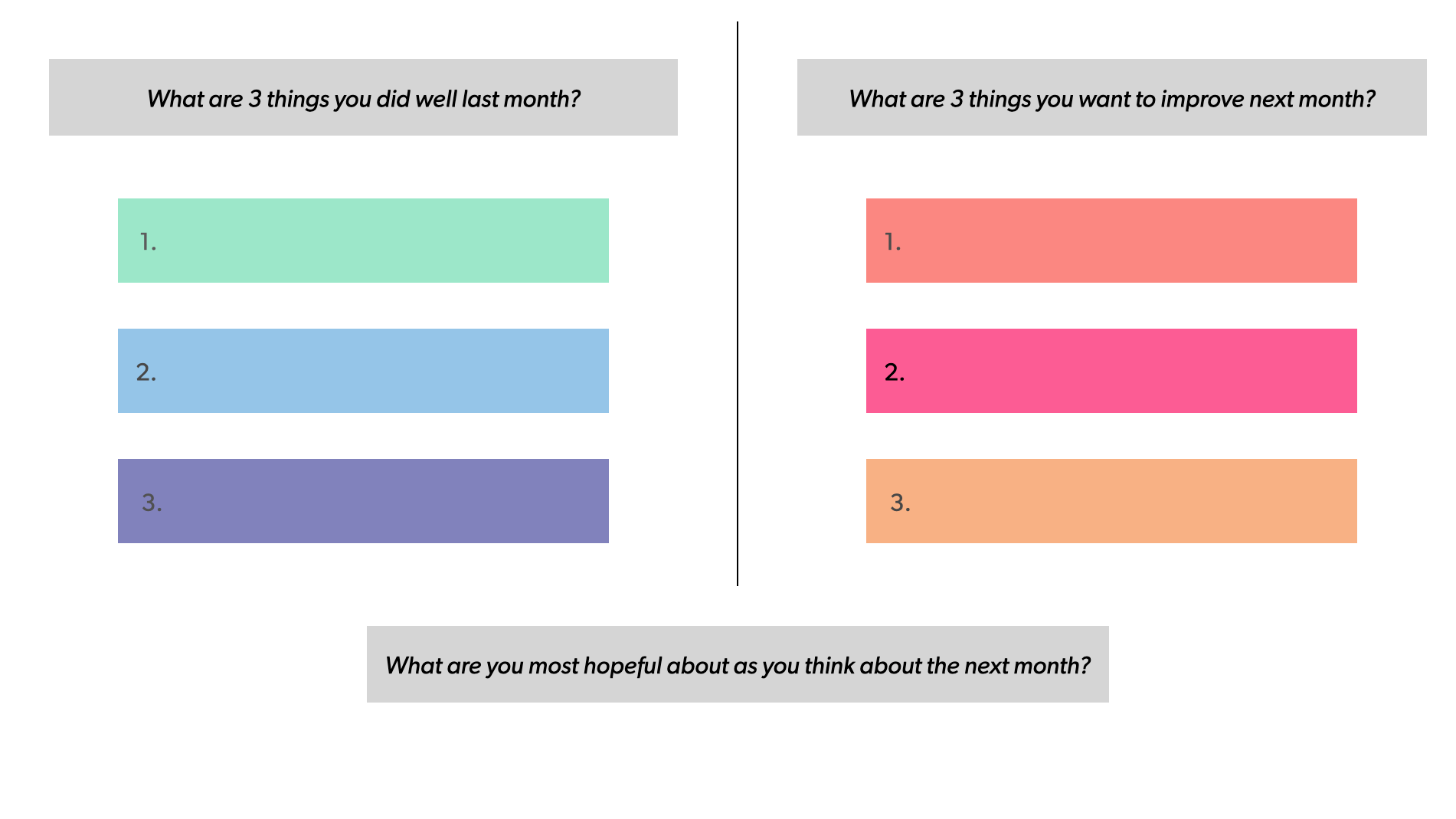Management can at times seem like staring down a large block of marble — an intimidating task that requires the right tools. And in our experience, most management advice tends to focus on tackling the biggest chunks: assembling high-performing teams through hiring, delivering tough feedback and checking in regularly. Of course, holding regular 1:1 meetings and honest performance reviews are critical items on your manager checklist to get right — but sculpting a magnificent piece of art also relies on the finer chiseling work of shaping that rock, bit by bit. After all, it’s the smallest movements and the intricate detail work that makes a statue worthy of display in a museum. However, this tends to be overlooked.
“The signs that you have a great manager are the actions you don't think about until later. Part of a weekly conversation where they stop and listen to the team, waiting until everyone's had a chance to share their thoughts. Or the way they pull you into conversations with support, knowing you might be taking a risk, but they always have your back. Even just the occasional overshare about their own lives to show you're all human,” says Michael Kellar, Senior Product Manager at Corvus Insurance.
It got us thinking — what are the little daily habits that often go unnoticed, but when linked together add up to form an incredibly strong chain between manager and direct report? To that end, we spent the past few weeks reaching out to folks all across the First Round community for their take on this question:
What are the small things a great manager has done that have stood out to you across your career?
What follows is a can’t-miss list of 25 targeted tactics for upping your management game — no rote training sessions required. Some folks spoke from their experience as a direct report under a favorite manager in their career. Other startup leaders we admire with tons of people management experience opened up their own playbooks. Whether you’re a brand-new manager, a seasoned vet, or have goals for taking on a management role in the future, there’s plenty of leadership development tactics for you to jot down.
To make the mega-list easier to digest, we’ve broken it down into eight categories — use the outline on the left to navigate to each section. Each category is defined by a soft skill like vulnerability and building trust, followed by a few tips to put those amorphous traits into practice, like monthly reflections or tactics for delivering feedback with care. We assembled this list with hopes that you’ll find at least a few ideas you’re excited to try out — and a greater appreciation for the micro-actions that set stellar managers apart.
EMPOWER YOUR TEAM TO ACT LIKE AN OWNER.
Most folks don’t intend to micro-manage — but when priorities pile up and your own boss is pinging you for updates on that encroaching deadline, the urge to take the reins from your team is hard to ignore. But breaking this habit is critical to give folks the opportunity to flex muscles that would otherwise atrophy and stop them from reaching their full potential.
1. Don't swerve around a debate.
“Looking back on my career, my favorite managers allowed me to own decisions, even if they disagreed with me. They couldn't do this for every decision — some were just too expensive or difficult to reverse. But if they spotted an opportunity for me to own a decision, they let me run with it. This would often be preceded by spirited debate, where they challenged my assumptions and forced me to think through various outcomes. Then they gave me the space to decide and room to fail and learn (and to sometimes surprise them),” says Jan Chong, VP of Engineering at Tally.
Sean Twersky, VP of Operations at UserLeap, suggests managers commit one particular phrase to memory — and use it liberally.
“I trust you, make the call” might be the six most powerful words you can hear from a supervisor.
2. Be generous with your ideas.

“The best manager I ever had was gifted at coming up with big ideas. He saw incredible market opportunities and was constantly thinking of programs that would improve our offerings. But what made him the best was how he passed these ideas along to the team to bring them to life. Along with them, he would share his utmost confidence that we would make them better than he ever imagined. This enabled me to do some of the most creative work of my career, and I felt supported and believed in along the way,” says Camille Ricketts, Head of Marketing at Notion.
3. Think of yourself as the team captain, not the head coach.
“I believe that healthy adults don't derive any pleasure from a ‘waterfall’ power structure.
When a manager understands their role is as a coordinator of priorities and doesn’t act from a place of authority, they typically buy into the broader concept of being part of a team with each team member equally responsible for success, trusted to do their work as adults,” says Michael Papet, Database Administrator for Edify Labs.
Claire Byrne, Senior Customer Success Manager at Outlier, puts it simply:
The best managers "ask" more than they "tell."
4. Set the tone with cross-functional partners.
Giving direct reports the freedom to operate as owners extends beyond your immediate team — weave this thread across the entire company fabric. “Oftentimes other leaders in the company may come to me as a partner in driving a decision or initiative forward. Rather than jump right into it, I try to recommend that they go directly to one of my direct reports. I communicate to both the partner and my direct report that I'm available if needed, but that I trust my direct report to have full decision-making ability,” says Edwin Chau, Engineering Director at Brex.
BE VULNERABLE AND SELF-AWARE.
For years in management circles, there have been larger conversations about bringing our whole selves to work and this went into overdrive once we all started working remotely from our kitchen tables (with kids, pets, and piles of laundry all front-and-center on Zoom). We’re shedding our more stoic “work persona” and making space for the messier emotions that previously weren’t on display in the office.
As Liz Fosslien, Head of Content at Humu, previously wrote on the Review — it’s a long-overdue reckoning, and high-impact leaders need to set the tone by modeling authenticity to their team, rather than always plastering on a brave face. “Part of the reason why emotions have such a bad reputation is that we’ve tried to keep them out of the workplace for so long. We suppress everything we feel, which means we don’t resolve issues while they’re still manageable. Instead, our feelings fester,” she says.
5. Write down what makes you tick.

“Great managers demonstrate self-awareness and empathy by sharing their working style preferences and development areas. I've always appreciated when managers provide an onboarding guide to who they are as a person and a manager. This should include their work styles, expectations of their directs, values and motivations, areas of feedback they are working on and decision-making preferences,” says Dennis Yu, Chief of Staff and VP of Program Management at Chime. (If you’re looking to put this one into practice PatientPing co-founder and CEO Jay Desai outlined the importance of creating a user guide right here on The Review— and included plenty of examples to help you get started creating your own.)
As Product Lead on the New Product Experimentation team at Facebook, Sunita Mohanty has even experimented with sharing her team’s user manuals during the interview process with top candidates. “This builds psychological safety and trust and can set a clear bar for transparency and honest introspection. As people are considering your team, I’ve found this can be a great way to find alignment with potential team members,” she says.
6. Shine a light on failure.
In addition to sharing her working guide, Mohanty also implements a weekly habit to get folks on her team on steadier footing, even amidst stumbles. “When you set an example of being vulnerable, it makes space for greater psychological safety on the team. As I’ve moved through my career, I’ve learned how it’s okay to show some vulnerability — whether it’s about a personal challenge or something I’m struggling with at work. As a result, it builds deeper relationships with my reports to feel okay expressing feelings of burnout or other messy feelings,” she says. To get tactical, Mohanty suggests managers share one high and one low each week, either in a team meeting or in a weekly email, to create an atmosphere of reflection and transparency.
Failure isn’t easy for anyone to talk about — especially for managers who feel like folks are counting on them to get things right. But no one’s infallible, and working at a fast-paced startup relies on folks feeling like they can try new ideas and fail fast. “Share a story where you've failed personally or professionally and what you learned as a result. It sheds light that we're all human and on the same level. It allows team members to share their concerns and feel like it's okay to fail,” says Trish Leung, Senior Director of Monetization and Pricing Strategy at Pantheon.
7. Pull back the curtain.
And don’t hesitate to open up about the fun stuff, too — especially when workplace stress piles up. “Share a personal update or just a quick anecdote from your life outside of the office — it doesn't have to be big or significant or detailed. Even something as simple as, ‘My son did this today for the first time and it was so cute!’ This makes employees also feel like they can bring their whole selves to work and share with team members. This is especially important in a remote world where it's a lot easier for people to feel isolated and disconnected,” says Michelle Lee, Head of Operations at Subscript.
TURN INTO A TRUSTED THOUGHT PARTNER
As a startup picks up altitude and moves past the MVP stage, there are a number of features, marketing campaigns, or sales tactics to tackle. To stay nimble, high-impact managers must strike the balance between excelling at the basics and juggling new ideas that make a splash.
8. Make space for reflection.

“A startup doesn’t just move fast — it moves too fast. Our jobs change too quickly, requiring a constant adjustment to how we operate to stay effective. A monthly reflection is the single most valuable tool I’ve found for scaling yourself in a fast-paced environment with continually increasing responsibilities. This is also where we establish a lot of trust and I show care for each team member, which in turn allows me to push the team harder on a daily basis without erosion,” says Jaleh Rezaei, co-founder and CEO of Mutiny. (Her frameworks for speeding up your marketing engine is a Review must-read for marketing leaders.)
She advises setting up specific 1:1 monthly meetings with each team member, where the report reflects on the three things that went well the past month, and three things they’d like to go differently in the next month. Rezaei then shares her own 3x3. The conversation ends on a buoyant note: What are you most hopeful about as you think about the next month? To get started, you can borrow from her template.

When we move too fast, our development areas tend to get amplified and we gloss over our strengths and impact. Without taking time to reflect regularly, we don’t adjust our behavior fast enough — and bad patterns start to emerge and we forget to celebrate our wins.
9. Reserve time for thinking outside the box.

While you’ve likely established some sort of regular weekly check-in with direct reports, these meeting blocks can quickly get eaten up by basic status updates rather than thinking bigger. Carve out time specifically to get creative. Jeannie Chun, People Business Partner at Sift, recommends setting aside time for dreaming up new ideas: “Providing regular blocks of time for brainstorming and ideating together has been super helpful to bring non-urgent matters to discuss and process and remove ‘thinking or planning’ blocks for kicking off new projects”
10. Find the connective tissue.
As an organization grows, there’s an increasingly heavy burden to connect the company’s vital organs together. The high-impact manager spots opportunities to tie their team’s work with the broader goals all across the org chart.
“The best managers provide context for executive decision-making and rationale that enables me to prioritize with a cross-functional lens,” says Frances Chen, Head of Veterinary Translation Medicine at Loyal.
And top-performing managers put a premium on context. “My manager, from the very beginning, has taken time out of his incredibly busy schedule to answer questions thoroughly and find teaching moments. He doesn't just answer my specific question, he ties it into broader themes and sometimes even goes up to the whiteboard and diagrams things out. Having a CEO take the time to help me personally develop makes me feel valued and supported,” says Margie Mathewson, VP of Business Operations at Ossium Health.
11. Resist the urge to multitask.
As a startup grows (along with the mountain of work on your plate) regular 1:1s can seem more like rote rituals than effective meetings. But the very best managers approach 1:1s with great care. “My manager listens, always — whether it's about a problem at work, a funny story about a pet, or something I’m excited to learn. In our 1:1's, they are always present and not sidetracked by performing other tasks on the side,” says Laura Percy of Truveris.
Outside of 1:1s, there’s plenty of questions or issues that crop up — sometimes at what feels like the worst possible time. “The best managers I've worked with always make the time to talk to you, no matter how busy they are. They realize that five or 10 minutes invested immediately not only addresses the topic in question, but it also shows the employee that their needs are a priority,” says Kevin Cassidy, Director of Product Design of Simplifeye.
12. Follow up and follow through.

As an individual contributor, following through on deliverables is core to succeeding in your role. But as you move into the management track and calendars fill up with countless meetings, these good habits can begin to slip. “A small action that has a big impact is just following up and following through consistently,” says Rachel Lary, Director of Professional Services at Seismic.
Liz Kosinski, VP of People Operations at Sift, echoes that this is often undervalued.
The best managers are incredibly consistent — they’re almost always on time, follow-up, and close the loop on open items. The diligence and consistency seem straightforward but are rare in a leader.
LEAD WITH EMPATHY — ALWAYS.
Whether you’re a first-time manager or have a resume full of leadership positions, like the most-loved knives in a chef’s kit, your people management tools frequently need sharpening. Maybe a thorny issue has cropped up between members of your team, or your startup is hitting its stride (which comes with growing pains), or you’re managing remotely for the first time. Tap into your empathy reserves to clear these hurdles.
13. Don't forget the humans behind the company's goals.
“When my managers have been great, they’ve looked at my situation with compassion above all, above what they (or the company) need from me. The same goes for when I’ve been my best as a manager. That doesn’t mean the company’s priorities don’t prevail — it just means I feel acknowledged as a human being in whatever the situation is,” says Devan Goldstein, Product at Elevate Labs.
“It’s not trivial to pull off because there’s so much pressure on a manager’s shoulders to extract value from a team (to put it in the coldest terms). There’s not often as much pressure to consider those team members in their full humanity. I’ve been fortunate to work for managers who make the experience as human(e) as it can be. I do everything I can to pass that experience on to my directs.”
14. Encourage folks to put themselves first.
Some reports may wear their heart on their sleeve, and you can quickly decode when something’s awry. Others may have a poker face — but deserve just as much attention.

Rafael Fonseca, Engineering Manager at Vital, recommends checking in privately when you notice a report is struggling. Lauren Jones, CX Associate Manager at Warby Parker, has seen great managers go a step further and gently nudge folks towards a much-needed break. “If I'm feeling overwhelmed, my manager encourages me to take time off and actively asks how she can lighten my load. These actions help me feel cared for and supported,” she says.
And when your report is out of the office, resist the urge to ask a quick question over Slack. “If I'm sick or dealing with a personal matter and out on short notice and there's something urgent, my manager handles it. Full stop. My manager doesn't need to ping me or ask a lot of questions, distracting me from my time away — they're just able to take care of it,” says Ting-Ting Zhou, Product Manager at Oculus VR.
CHALLENGE FOLKS WITH KINDNESS.
Regular, candid feedback is a key piece of any manager’s role — and also one of the trickiest to get right. There are all sorts of landmines that can blow without warning — even the word “feedback” can cause folks to cover their ears because it’s so rarely done right. But when approached with care, feedback nudge reports closer to their career goals.
15. Cushion the blows.
Being a supportive manager is easier when the road is well-paved — you’re shipping your deliverables, not missing deadlines, and cross-functional partners are happy. But any startup’s path is littered with potholes and speed bumps that can quickly throw you off course.
“Early on, my manager told me, ‘I don't want you to mess up. But if you mess up, I will have your back.’ This instilled in me that my manager trusted my decisions, was willing to help me through potential failure, and subtly applied pressure to live up to that trust. He said it once, but it was impactful enough that I still think about it when I face a new decision in my role,” says Madeline Willett, Associate Director for Division Operations at Verto Education.
Mistakes happen — if they don’t, it probably means you’re not being ambitious enough. That’s why blameless post-mortems have become a startup mainstay. “My manager always has my back. Even if I've made a mistake, they explain what went wrong, we work together to devise a plan to keep it from happening again, and then move forward without blame. It may be my mistake, but my manager always lets me know I'm not alone,” says Laura Percy, Customer Success Manager at Truveris.
16. Create a monthly performance review action plan.
Previously on The Review, Lenny Rachitsky shared his performance reviews system that’s chock-full of advice for making the dreaded process more impactful than painful. The key to his approach? Following up those annual reviews with monthly touchpoints. “After the performance review conversation, turn each of the feedback items into a tactical action plan your report can concretely work on. Then, like any project, check in on how they're progressing and share advice, coaching and guidance along the way.” Here’s a template you can use:

17. Reinforce good habits.
“When I go to my manager asking for her to provide feedback on a resource or simply take a look at something, I appreciate that she challenges me to share my intent and clarify what I'm looking for in a response. This helps streamline communication and prevent any misunderstanding, and that clarity of thought is something I always remember when I’m making an ask,” says Lauren Jones of Warby Parker.
18. Take a beat before delivering feedback.

“I think the ‘One Minute Manager’ may have said it best: A great manager praises in public and reprimands in private,” says Jean Borno, founder and CEO of 1787fp.
To set the tone with a new report, Mandy Poling, Head of People Operations at Crossbeam, strongly suggests asking folks how they prefer to receive feedback early in the onboarding process.
Facebook’s Sunita Mohanty recommends prefacing feedback with a simple framing. “My previous manager knew it would be most impactful to give feedback right away on how I could have presented better in a review or ran a meeting more effectively. But there is also the risk of not being in a mental space where I really hear the feedback. He would do a great job of stopping to first ask if I’m open to hearing feedback and then proceeding, which made me way more receptive to whatever came next,” she says.
CELEBRATE AND UP-LEVEL THE SMALL MOMENTS.
Amidst finding product/market fit, moving upmarket, or going through a new round of fundraising, there are all sorts of big milestones that get attention. But for each big achievement, there are dozens of smaller touchpoints along the way worth cheering for.
19. Look for opportunities to praise in the moment.

“A leader who recognizes and celebrates the smaller milestones on the way to a larger goal helps to keep momentum and motivation. This can be done through something informal like a Slack channel — direct reports can share milestones accomplished or even small wins and get feedback, questions, encouragement, or just a thumbs up,” says Daniel Scott, Digital Marketing Manager of Kandji.
Jaleh Rezaei, CEO of Mutiny, is another fan of leaning on Slack for quick hits of positivity. “When I see something that I really liked, I usually will send a message to the person with a short heartfelt message like, ‘It was incredible for me to watch you shine in the meeting. Well done,’” she says.
While Sunita Mohanty’s seen a louder approach: “Bang the drum — literally. A friend of mine loves using props to get her team fired up, like a tambourine she shakes when she’s excited about what someone says. Great managers do small things to help their teams have fun and take the work seriously while not taking themselves too seriously,” she says.
Each individual person’s strengths are superpowers that lead to an all-star team. Find moments to recognize specific ways that each person’s superpower shines and encourage team practices around sharing gratitude for each other.
20. Spot chances to send kudos up the chain.
A “job well done” can go a long way — and it’s an added bonus if this gets surfaced to folks higher up on the org chart. “I always remember the moments when a manager goes out of their way to up-level you and give you all the credit for the success you achieved,” says Shannon Armbruster, VP of People at Cricket Health.
Edwin Chau of Brex suggests specifically fitting this into the agenda with higher-ups. “Every weekly meeting with his direct reports, my manager (the CTO) has us each share some amazing things that members of our groups have accomplished recently. These team members could be four-plus levels removed from my manager,” he says. This next step is key: “My manager then sends a short, but extremely impactful email to all the folks that got mentioned recognizing their accomplishments. It's often a surprise to folks that someone many levels removed has that level of visibility into their work and is aware of their contributions.”
21. Celebrate moments outside of the office, too.
“My manager has twice now sent me a thoughtful gift out of the blue — once over the holidays and once when my son was born. Neither was work-related, but it was a wonderful reminder that he cared enough to remember the important occasions in our lives and it brought us closer together,” says Miki Cisic, Head of Strategic Partnerships at Lob.
KEEP AN EYE ON LONG-TERM GROWTH.
In a recent interview on The Review, Persona co-founder and CEO Rick Song spoke about how he measures his team-building success using a peculiar benchmark that’s stuck with us: “As a founder, all I really try to index for is that 10 years down the line, if we were to suddenly go out and say, ‘Hey, there's going to be a reunion,’ all Persona alumni would all really look forward to seeing each other. And if that were true, I would think I've done a great job.”
The best leaders understand that great folks will move on from your team or your company for different opportunities — and take key steps to bring those hazy, long-term goals into clearer focus.
22. Invest in their career.

“My manager takes care to nominate me for new projects that fit my strengths and are in line with my personal goals. This shows me she is attentive to where I'm looking to grow and caters opportunities based on those growth areas,” says Lauren Jones of Warby Parker
For Vanessa Williams, Product Marketing Manager at Square, the best managers in her career aren’t just cheerleaders — they help shape the game plan.
Great managers openly recognize this role is just one stop on your journey and are clear about wanting to help you figure out and get to what's next.
23. Bring in mentors and skip-levels.
Mentoring reports to reach their career goals is a massive undertaking — reinforcements help share the load. “Great managers connect employees with mentors who don’t just help them with what they want to do today, but with what they want to do five years from now,” advises Sean Twersky of UserLeap.
And for folks who are managers-of-managers — keep this in mind for your skip-level reports. “I’ve had a great skip-level manager take the time to zoom out and envision possible career trajectories with me. This can go a long way to show that besides your direct manager they also care about your future and growth at the company,” says Mona Sheikh, Director of Product at Suki.
24. Make space for growth.

“Awesome managers are active rather than passive in pursuit of their reports' well-being. They go beyond asking, ‘How are things going?’ and ask what the best and worst aspects of the job are. They normalize and make space for change so that no one feels stuck or boxed in,” says Catherine Miller, Vice President at Flatiron Health.
Sunita Mohanty advises reserving time monthly to keep a pulse on career opportunities. “Since weekly 1:1s can focus more on immediate problem solving, I try to reserve time monthly to talk about personal and career growth with my direct reports. When you are able to coach someone into finding the zone where their personal goals and the team goals are well aligned, you get magic,” she says.
25. Sharpen your arrows.
“One of the best pieces of advice I've gotten from a manager is about ‘periodically sharpening the arrows in your quiver.’ This means checking in on the craft skills that make folks in your role exceptional and considering how they might grow, whether internally or through external training,” says Nikita Miller, VP of Product of Dooly. That could mean letting reports take time to go to a conference, setting up a team-wide coaching session, or carving out time for personal development work.
